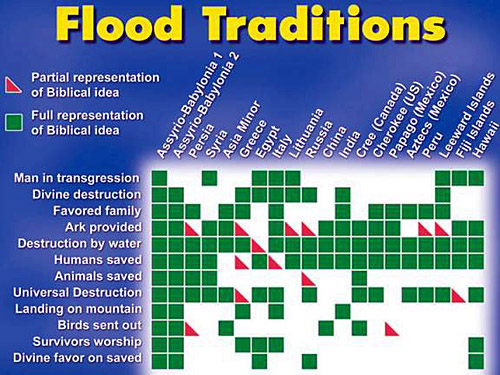I think that you do. You made that pretty clear in your post #17.
My sense is that you want to believe that the Bible reveals cosmic truth, but you are uncomfortable taking some (not all) parts of it literally. So you are looking for some other way to interpret some of the more problematic stories that simultaneously acknowledges them as allegorical while preserving their transcendental significance.
Personally, I'm inclined to think of Carl Jung pretty much as a fascinating crank. Nor am I impressed with psychoanalysis. If you and Wellwisher want to take the discussion in that direction it's ok with me, but I'll leave that to you two.
I've already expressed my own opinion on flood-myths.
Now, now. You know we had our conversation prior to post #17. How could I have known what wellwisher would say? As it says under my avatar, I am just trying to figure it all out. Unlike so many people here, the 'scientific' ones being no exception. I haven't absolutely made up my mind about anything. Perhaps you are so used to them that you can't recognize intellectual honesty.
I don't believe that the Bible reveals cosmic truth, I know that it does, and so would any honest person. And I am not contradicting what I have just said above. For instance: cosmic, Biblical truth - 'love your neighbor as you love yourself'. Of course that is right and good. Now an example of me not absolutely having made up my mind: 'Ah, I just got my month's salary, and I don't think I'm going to hand it over to the first homeless man I see.' or 'I think i'll eat this pint of raspberry chocolate ripple ice cream all by myself.'
I was saying...I know that the Bible reveals cosmic truth, and it's not that I am uncomfortable with any of it. That's the wrong word. Unlike most people, I've read the Bible a dozen times over end to end. So I know that it's not just this one book with a half a dozen concepts and I know that there's way more to it than meets the eye. I will read it again, some of it, maybe all someday, but I don't ever suspect I'll fully understand it, and be "comfortable" with it.
'Comfortable' is just the wrong word. Say, you go on an extended tour encompassing the Pacific Ocean. You visit the Aleutians, Fiji, Tahiti, Easter, Galapagos, every last island and even spend a year on New Guinea studying up on the 2,000 languages spoken there on that island. Then I ask if you are 'comfortable' with what you absorbed and learned. How would you answer?
I will grant you that some of the stories make no sense (to me) and would venture to no modern people, like Genesis 19:30-36
30 And Lot went up out of Zoar, and dwelt in the mountain, and his two daughters with him; for he feared to dwell in Zoar: and he dwelt in a cave, he and his two daughters.
31 And the firstborn said unto the younger, Our father is old, and there is not a man in the earth to come in unto us after the manner of all the earth:
32 Come, let us make our father drink wine, and we will lie with him, that we may preserve seed of our father.
33 And they made their father drink wine that night: and the firstborn went in, and lay with her father; and he perceived not when she lay down, nor when she arose.
34 And it came to pass on the morrow, that the firstborn said unto the younger, Behold, I lay yesternight with my father: let us make him drink wine this night also; and go thou in, and lie with him, that we may preserve seed of our father.
35 And they made their father drink wine that night also: and the younger arose, and lay with him; and he perceived not when she lay down, nor when she arose.
36 Thus were both the daughters of Lot with child by their father.
Whoa!

What's up with that?
Now if anything makes me 'uncomfortable', it is that the religious fundamentalist will tell me I must have faith and just accept this story as the literal truth and that The Lord works in mysterious ways.
And...
...that the scientific fundamentalist, the agnostic, the atheist, the 21st century man will tell me not to worry about what it could mean because it's all a made-up lie anyway - it must be because we have no evidence that it actually ever happened. However, the agnostic will not acknowledge that the Hebrew scribes have a 3,000+ years' reputation for exactitude in copying and preservation, and would no more alter a text than a proper scientists would fake lab results. And why would they preserve such an unflattering story of their ancestors?
As for Carl Jung, for you he may be nothing more than a fascinating crank, but look at it from anyone beside your own perspective. With due respect, my friend, should I dismiss just about the foremost psychiatrist and psychotherapist the world has ever known on
your say so? A genius whose thought will undoubtedly continue to influence world culture for hundreds, if not thousands of years to come? Um... who are you again?

